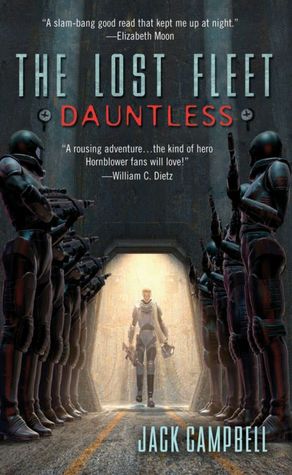Military Science Fiction hasn’t always been my go-to Speculative Fiction subgenre. I liked it, sure, but I was more often drawn to Epic Fantasy with toe-dips into Urban Fantasy, New Weird, Space Opera to name a few. Over the past year or so, I’ve been gravitating to Military SF for reasons I can’t quite explain, maybe the space battles, perhaps a yearning for something to fill the post–Battlestar Galactica hole, but for whatever reason, I’ve read quite a few of them in the past year. One series I’ve seen discussed over the past year, in my internet circles, is Jack Campbell’s Lost Fleet series. Maybe because the first six-book series recently completed and is receiving release in the UK through Titan books this year, or maybe because a new ‘sequel’ series was launched this year with Dreadnaught including a “promotion” from Mass Market Paperback to Hardcover. These things tell me Jack Campbell has been doing good things with the series. Reading Dreadnaught earlier in the year gave me an inkling those things were right. What finally convinced me was reading Dauntless, the first Lost Fleet novel.
“Jack Campbell” is the pen name of John G. Hemry, a former Naval Officer, who under his own name published two Military SF series (Stark’s War and JAG in Space) before turning his pen to what is now his best known work of fiction. Dauntless sets the stage for the series: a time lost hero, Captain John “Black Jack” Geary who helped save the Human Alliance from their enemies the Syndicated Worlds (also human) 100 years prior to the opening of the series, is set into suspended animation after making a heroic sacrifice is found adrift in space.
When Geary is woken he is thrust back into the vanguard of the war, which is fine because it is very much the life he knew except for one major snag. With the passage of 100 years since Geary’s heroic sacrifice the event is legend and Geary himself is looked upon as a Hero out of Myth Who Has Come to Save Us. The parallel to King Arthur is hard not to see.
Throughout the novel Campbell balances Geary’s reluctant living legend status with the situational demand that Geary actually live up to those mythical ideals. In many ways, the novel can be considered something of a Hero’s Journey. Campbell’s balanced cast of characters either implicitly, almost blindly, believe Geary will save them or they think Geary’s legend is just a false belief held by the crew of the fleet. I suspect it isn’t a coincidence that for his pen name Hemry chose “Campbell.”
Geary also struggles with changes to military society in the 100 years since his sacrifice. Rules and mores that were implicit during his time have fallen by the wayside, there’s more talking than action, more voting (from subordinate officers) on what should be done rather than the commanding officer actually commanding. It is only because Geary is the living legend of Black Jack that he’s able to shake up the status quo and return to the effective functioning military to which he was accustomed. In something of an inversion, it is the Old Man who has to break the rules of the Young Ones.
The other driving force of the novel is military life aboard a vessel, which itself is part of a larger fleet. There’s a nice truthiness of the politics of a military organization, the conflict between military officers amongst themselves, as well as the conflict between military personnel and government officials. With Hemry’s military background the credence in the narrative, to this reader, is no surprise. What’s more impressive is Campbell’s ability to keep the narrative exciting and engaging in both the action sequences and the character/dialogue sequences.
Dauntless is a very short novel, just under 300 pages in Ace’s US mass market paperback, so is clearly (as if the five other books on the shelf aren’t an indicator) the first of a series. Though it is indeed a table-setter in terms of Campbell presenting readers with the protagonist and milieu, Campbell brings closure to the initial conflict he set at the beginning of the novel getting the fleet closer to home. The antagonists in the series at this point the Syndicated Worlds aren’t given much depth, which for the first in a longer series is fine. Knowing the protagonist, his supporting cast, and the overall conflict should allow a better weaving into the story of the antagonists. This makes it a quick, digestible read that will leave you wanting more. I know that’s the effect Campbell’s story had on me. He hits a lot of notes very well in Dauntless, and despite the flashiness of what on the surface seems to be a lively batch of space-based conflicts, he examines the many facets of the Mythic Hero. If you’ve read David Weber’s Honor Harrington series and want something that more than fills the void between installments, give Dauntless a try. More simply, if you’re a fan of character, action, and conflict in a Military SF setting, you would probably be more than pleased by Campbell’s offering.
Rob H. Bedford is a lifelong a fan and reader of Speculative Fiction. He has a blog and, for about a decade, he has been contributing reviews and interviews and moderating the discusson forums at SFFWorld. He lives in New Jersey with his wife and dog.










